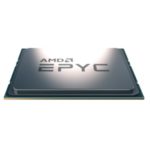SANTA CLARA, Calif. — Sept. 14, 2020 — AMD (NASDAQ: AMD) today announced a second round of high-performance technology contributions to assist in the global fight against the COVID-19 pandemic. AMD is now contributing high-end computing systems or access to Penguin-On-Demand (POD) cloud-based clusters powered by 2nd Gen AMD EPYCTM and AMD Radeon Instinct processors […]
AMD COVID-19 HPC Fund Adds 18 Institutions and 5 Petaflops of Supercomputer Processing Power to Assist Researchers Fighting COVID-19 Pandemic
AMD and Penguin Computing Upgrade Corona Supercomputer to fight COVID-19
Today Lawrence Livermore National Laboratory, Penguin Computing, and AMD announced an agreement to upgrade the Lab’s unclassified Corona HPC cluster with AMD Instinct accelerators, expected to nearly double the peak performance of the machine. The system will be used by the COVID-19 HPC Consortium, a nationwide public-private partnership that is providing free computing time and resources to scientists around the country engaged in the fight against the coronavirus.
New Weka AI framework to accelerate Edge to Core to Cloud Data Pipelines
Today WekaIO introduced Weka AI, a transformative storage solution framework underpinned by the Weka File System (WekaFS) that enables accelerated edge-to-core-to-cloud data pipelines. Weka AI is a framework of customizable reference architectures (RAs) and software development kits (SDKs) with leading technology alliances like NVIDIA, Mellanox, and others in the Weka Innovation Network (WIN). “GPUDirect Storage eliminates IO bottlenecks and dramatically reduces latency, delivering full bandwidth to data-hungry applications,” said Liran Zvibel, CEO and Co-Founder, WekaIO.
Time Lapse Video: Building the Attaway Supercomputer at Sandia
In this time lapse video, technicians build the new Attaway supercomputer from Penguin Computing at Sandia National Labs. In November 2019, the Attaway was #94 on the TOP500 Supercomputers list. “On February 28, 2019, Sandians lost a long-time colleague and friend, Steve Attaway. Steve spent over thirty years at Sandia, and during that time he helped bring big, seemingly impossible ideas into realization. The Attaway supercomputer is named after him.”
Penguin Computing to Deploy Magma Supercomputer with Intel Xeon Platinum 9200 Processors at LLNL
At SC19, Penguin Computing announced a powerful new supercomputer coming to Lawrence Livermore National Laboratory. Called Magma, the system was procured through the Commodity Technology Systems (CTS-1) contract with the National Nuclear Security Administration (NNSA) and is one of the first deployments of Intel Xeon Platinum 9200 series processors with support from CoolIT Systems complete direct liquid cooling and the Intel Omni-Path interconnect.
Penguin Computing Expands Altus Product Family with AMD EPYC 7002
Penguin Computing just announced the availability of AMD EPYC 7002 Series Processors for Penguin Computing’s Altus server platform. AMD EPYC 7002 Series Processors are expected to deliver up to 2X the performance-per-socket and up to 4X peak FLOPS per-socket over AMD EPYC 7001 Series Processors. These advantages enable customers to transform their infrastructure with the right resources to drive performance and reduce bottlenecks. “We’ve been waiting for this processor, which enables us to deliver breakthrough performance in solutions designed for AI and HPC workloads. In particular, we expect the EPYC 7002 to utilize PCIe Gen 4 to bolster workloads that had been bottlenecked by the bandwidth of PCIe Gen 3.”
Penguin Computing Breaks STAC-M3 Performance Records with WekaIO
Today Penguin Computing and WekaIO announced record performance on the STAC-M3 Benchmark. The STAC-M3 Antuco and Kanaga Benchmark Suites are the industry standard for testing solutions that enable high-speed analytics on time series data, such as tick-by-tick market data. “By combining Penguin Computing Relion servers and FrostByte Storage with the WekaIO File System, the companies have affirmed that this integrated solution is ideal for algorithmic trading and quantitative analysis workloads, common in financial services.”
AMD Powers Corona Cluster for HPC Analytics at Livermore
Lawrence Livermore National Lab has deployed a 170-node HPC cluster from Penguin Computing. Based on AMD EPYC processors and Radeon Instinct GPUs, the new Corona cluster will be used to support the NNSA Advanced Simulation and Computing (ASC) program in an unclassified site dedicated to partnerships with American industry. “Even as we do more of our computing on GPUs, many of our codes have serial aspects that need really good single core performance. That lines up well with AMD EPYC.”
GPUs Address Growing Data Needs for Finance & Insurance Sectors
A new whitepaper from Penguin Computing contends “a new era of supercomputing” has arrived — driven primarily by the emergence of graphics processing units or GPUs. The tools once specific to gaming are now being used by investment and financial services to gain greater insights and generate actionable data. Learn how GPUs are spurring innovation and changing how today’s finance companies address their data processing needs.











